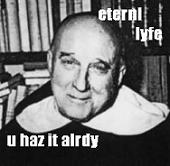In the earlier instalments of this essay, we have seen, first, that there is a well-established theological opinion that a pope can lose his office because of heresy, and next, that this loss of office could be authoritatively declared without implying that anyone in the Church has a power greater than, or equal to, the pope’s. In particular, I argued in favour of the position of John of St Thomas and of certain other outstanding theologians, that an official declaration may be made that a pope is an incorrigible heretic, and therefore, according to the divine law promulgated in Titus 3, must be avoided. According to this view, after such a declaration, Christ Himself deposes the pope.
But who would have the right to make this official declaration of heresy, which would introduce into the pope a disposition incompatible with his continued possession of the papacy?
To decide this, we need to consider by what title they would have to be acting. By what right would this group of people, rather than that one, have the right to make a public declaration, with legal consequences, about the heresy of a pope? The answer seems to be, because they are charged with the spiritual good of a community that would be gravely harmed if the declaration of heresy were not made. Now, the pope is by divine law the head of two communities, each of which would be gravely harmed by his heresy: the universal Church on earth, and the local church of Rome. Therefore, there seem at first sight to be two possible groups of people who could make the declaration of heresy: the body of bishops, gathered in council, as representing the universal church, and the college of cardinals, as representing the church of Rome.
It has to be admitted that there are some weighty authorities in favour of a general council of bishops. Bellarmine gives as one of the six possible reasons why a general council may be called, “the suspicion of heresy in a Roman pontiff”, adding that the council must depose him if he is found to be heretical (De conciliis, book 1, IX). This may seem to contradict what he says elsewhere about a heretical pope’s being ipso facto deposed. Presumably, what he means is that it belongs to such a council to make the two admonitions required by divine law, and that after the failure of the second admonition, the pope would lose the papacy ipso facto, without need for any further declaration from the council. In practice, then, his position about the loss of the papacy would not be very different from the alternative position upheld by Cajetan, John of St Thomas, and St Alphonsus (it may be that Bellarmine’s position was that, ideally, such admonitions would be made by a council, but provided that admonitions were clearly made in a public way by someone important, the papacy would be lost ipso facto in the case of pertinacity.)
John of St Thomas explicitly asks whether it is the bishops or the cardinals who should admonish the pope and make a declaration of pertinacity, and he says that it is the bishops. He gives two arguments for this, one positive and one speculative. First, he says that this is clear from the practice of the Church, as happened with Pope Marcellinus, Pope Symmachus and at the Council of Constance. Secondly, he says that the authority to make the declaration of papal heresy has not been given by any explicit law to a particular group, such as the cardinals, and therefore it belongs to the Church as such, and therefore it belongs to a general council, as representing the Church (Cursus Theologicus, De auct. Summ. Pont. disp. 2, art. 3, XVII.)
Neither of these arguments seems decisive. The affair of Marcellinus is too uncertain for any argument to be built on it; in any case, it did not involve a general council. The synod that met to discuss the position of Symmachus was likewise not a general council, but a gathering of bishops from nearby dioceses: and according to Bellarmine, such gatherings were the forerunners of, precisely, the college of cardinals. The Council of Constance “accepted” the renunciation of the papal claimants, but it does not follow that it had to accept these renunciations for them to be valid, nor that it would have had power to declare a pope deposed for heresy; papal heresy was not in question.
As for John’s speculative argument, this would be convincing if it were certain that a ‘general council’ without the pope at its head could represent the Church. But can it? Can there even be a general council without the pope? To call it an ‘imperfect council’, as some people do, seems like calling a decapitated human being ‘an imperfect man’. Each diocesan bishop has ordinary power to rule his diocese, but he does not have ordinary power to help rule the whole Church, or else the popes would be obliged to call general councils frequently. And again, who would have the authority to summon an ‘imperfect general council’?
The college of cardinals, on the other hand, unlike the ecumenical council, is a standing institution. It has its proper head, or at least, a president, namely the dean, who can summon the other cardinals to a conclave. According to the present law of the Church, it has the right to elect a pope, when the see is vacant. It can therefore be said to be charged with a general care for the spiritual good of the Roman church. It would therefore seem fitting that in the case of a suspicion of heresy in the Roman pontiff, the dean of the college should invite his fellow cardinals to discuss the matter, and if necessary, to admonish the pope twice and make a declaration in the case of pertinacity.
The judgement of Bellarmine and John of St Thomas, that a general council would be the proper body, was perhaps influenced by the memory of the Council of Constance. More recent authors, such as Louis Billot, often speak of ‘a general council or the college of cardinals’ as being the interested body, without trying to determine the question. Journet does not address it.
How many of the cardinals would need to agree, for their declaration to have legal force? Nothing in law determines this, as far as I know. It seems only reasonable that such a grave matter should be performed with at least as much care as is taken in the election of a pope, and so according to the present law, a majority of two-thirds would be needed. Of course a declaration of incorrigible heresy and of consequent loss of office would not in itself be infallible. But if it were accepted by all Catholics, then that would be a sign of its truth. Billot writes that the adhesion of the whole Church is the infallible sign of the legitimacy of a pope (De ecclesia Christi, vol.1, 29:2).
What if there is a suspicion of heresy, but the cardinals will not act? In that case, there are still three remedies: prayer, penance and the Swiss guards. Prayer and penance are the principal arms in any supernatural work. But the Swiss guards could also act in defence of the Church. No one is allowed to use physical force against a Roman pontiff, as this brings with it an automatic excommunication. But it would not be using physical force if the front door of his residence were kept locked, and the means of communication with the outside world were cut off, provided that he was given all that was needed for his bodily and spiritual welfare. Time is greater than space, we are told. So I suggest that such a pontiff could be given whatever time heaven wishes him to have, while being kept within a pleasant and well-defined – and well-guarded – space.


